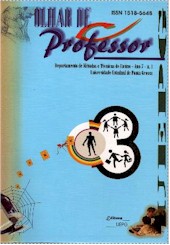Menino ou Menina? Gênero e Desenvolvimento Infantil
Conteúdo do artigo principal
Resumo
Objetiva-se, por meio da pesquisa, identificar a importância das relações de gênero no desenvolvimento infantil. Numa pequena cidade do sertão pernambucano, busca-se a livre expressão de crianças no contexto social mais amplo, extrapolando-se os limites do lar e das relações parentais. Quanto aos subsídios teóricos do trabalho, articulam-se estudos de gênero - diferenciados de sexo - especialmente os de Nancy Chodorow com a teoria de desenvolvimento infantil freudiana. Na pesquisa, inserida na metodologia qualitativa, usamse estratégias de filmagens, entrevistas e interações sociais espontâneas como meios de acessar crianças, entre 2 e 7 anos de idade, em suas atividades cotidianas de brincadeiras de rua ou em situações educacionais de creches e escolas. Norteia-se a elaboração dos dados coletados pela leitura pontual das filmagens, em cuja organização consideram-se idade, gênero e as interações entre meninos e meninas. Como resultados, identifica-se e confirmase a diferenciação de comportamento entre os gêneros, a qual é caracterizada de acordo com a idade dos envolvidos, e constata-se que essa diferenciação pode ser estimulada por alguns valores ou práticas sociais, vinculados pela prática pedagógica. Observando-se atentamente a relação das crianças com as figuras adultas, verifica-se os efeitos de identificação secundária. Conclui-se que é importante a continuidade de estudos que correlacionem gênero e desenvolvimento infantil, seja para aspectos clínicos ou educacionais. Adicionalmente, recomenda-se uma reaproximação das teorias psicodinâmicas com o estudo das questões de gênero, na busca de subsídios para a educação.
Downloads
Detalhes do artigo
Autores que publicam nesta revista concordam com os seguintes termos:
a) Os autores mantêm os direitos autorais e concedem à revista o direito de primeira publicação, com o trabalho simultaneamente licenciado sob a Creative Commons Attribution License Atribuição 4.0 Internacional (CC BY 4.0) que permite o compartilhamento do trabalho com reconhecimento da sua autoria e publicação inicial nesta revista.
b) Os autores são autorizados a assinarem contratos adicionais, separadamente, para distribuição não exclusiva da versão publicada nesta revista (por exemplo, em repositórios institucionais ou capítulos de livros), com reconhecimento da sua autoria e publicação inicial nesta revista).
c) Os autores são estimulados a publicar e distribuir a versão onlline do artigo (por exemplo, em repositórios institucionais ou em sua página pessoal), considerando que isso pode gerar alterações produtivas, bem como aumentar o impacto e as citações do artigo publicado.
d) Esta revista proporciona acesso público a todo o seu conteúdo, uma vez que isso permite uma maior visibilidade e alcance dos artigos e resenhas publicados. Para maiores informações sobre esta abordagem, visite Public Knowledge Project, projeto que desenvolveu este sistema para melhorar a qualidade acadêmica e pública da pesquisa, distribuindo o OJS assim como outros softwares de apoio ao sistema de publicação de acesso público a fontes acadêmicas.
e) Os nomes e endereços de e-mail neste site serão usados exclusivamente para os propósitos da revista, não estando disponíveis para outros fins.
______________

Este obra está licenciado com uma Licença Creative Commons Atribuição 4.0 Internacional.

